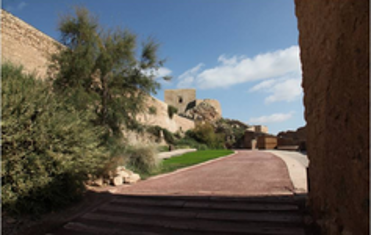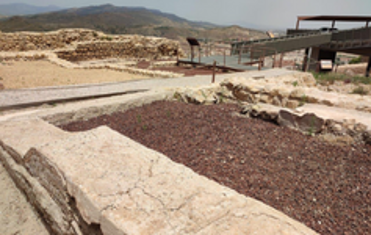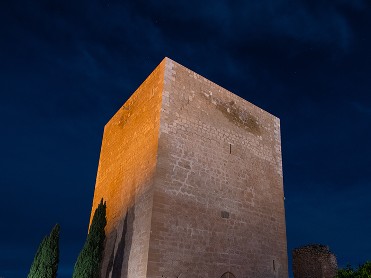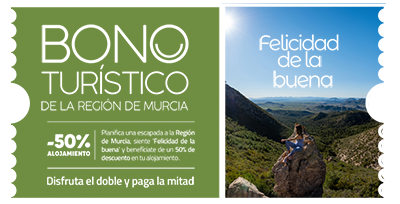Lorca: the city of the sun, the city of one hundred shields... or one hundred names
Castillo de Lorca
Centro de Visitantes
Palacio de Guevara
Semana Santa Lorca
Plaza de España, Colegiata y Salas Capitulares.
ABOUT
Lorca, whose urban centre was declared -a Town of Historical and Artistic Interest- in 1964, is described as "the baroque city", due to the important baroque heritage of its historical centre, one of the most important in the Region, and the historical events that have shaped modern Lorca from the Iron Age to our time.HERITAGE
Mention must be made of the numerous archaeological sites, the Columna Miliaria dating from Roman times, the Espolón Tower and the Alfonsina Tower, a Christian construction dating from after the Reconquest; the "Porche de San Antonio", the gate through the old wall that surrounded the city (in the 10th century), the numerous churches and convents dating from different periods and built in different styles (15th century to the 18th century), the baroque palaces and stately homes, such as the Guevara Palace, the Palace of the Counts of San Julián or Casa de la Mula, the military fortress that restructures the medieval castle on an inexpugnable site, or the paved streets around Plaza de España, with popular architectural buildings imbued with strong traditional character, such as La Zapatería y La Cava. Mention must also be made of the spectacular Biblical-Passion Week procession in Lorca, with the fervour of whites and blues, blues and whites; its traditional craftwork, with items still produced using craft techniques, such as ceramics, wall and floor carpets, intricate embroidery and iron forging.LORCA, WORKSHOP OF TIME
The people of Lorca are the protagonists of, and the driving force behind, the changes that are taking place in the town, and aimed at designing a strategy that will help to interpret, establish themes and communicate its rich heritage, and which will help to bring visitors to the historical, cultural, architectonic and artistic values of Lorca, in an attractive, interesting and unique way.Lorca: the city of the sun, the city of one hundred shields... or one hundred names. Whatever you may call it, it definitely stands out for being packed with monuments: a Medieval, Renaissance and Baroque city.
This impressive Medieval castle, considered to be Lorca's greatest symbol, can be seen from far away. This space, where Muslims, Christians and Jews lived together for centuries, is now a big theme area, designed for families to enjoy exhibitions, cultural activities and entertainment.
In the Archaeological Park of the Jewish quarter, you can visit the only Synagogue in Spain which was not turned into a Church afterwards, and admire its remains from the times when the Jews used to worship there by the end of the 15thC. Don't forget that next to the Archaeological Park is Lorca's Parador, where you can find a magnificent accommodation and also regain strength by tasting some of Lorca's typical dishes.
We introduce you to a different way of experiencing Lorca Holy Week. The embroidery museums of the Paso Azul, Paso Blanco, Paso Encarnado and Paso Morado suggest you learn first hand, and throughout the year, about the artwork created by the locality's needlewomen, as well as experience the most stunning episodes of this unbelievable celebration thank to the audiovisual presentations of brotherhoods.
If you enjoy walking through history, you shouldn't miss this itinerary, which will help you find out why Lorca is considered to have more monuments than any other locality in the region. If you're keen on culture, you'll be delighted by its museums, squares, palaces, singular buildings and churches. If you want to make the most of this route, we recommend you purchase the tourist bracelet, with which you can visit all the city's museums for free and benefit from discounts and special offers in shops and restaurants.
Lorca's Biblical Passion Parades are one of Spain's most spectacular Holy Week expressions, and that is why it has been declared to be of International Tourist Interest. Its chariots, horsemen, horses, floats, superb gold and silk capes, as well as the famous rivalry between Paso Blanco and Paso Azul, will turn your perception about the Holy Week upside down.
During the summer, even if it may sound odd, you will specially enjoy the nightlife in the City of the Sun. Every year, dramatised night visits, concerts and shows take place for you to enjoy your holidays. We suggest you turn your concept of sightseeing around: why not going out for tapas with a sunset background, enjoying a pleasant starlit dinner at the terrace of the castle, or exploring constellations with powerful telescopes? Suitable for the whole family.
Even if all roads lead to Rome, this one goes straight there. Going along this old road, which used to link Hispania to the Empire's capital city, is the perfect excuse to visit Lorca, walk on history and enjoy a great variety of landscapes by the river Guadalentín. Either on foot or by bike. At the Municipal Archaeological Museum, several milestone columns found at the end of this section are exhibited. Their aim was to signalise distance every mill passus or Roman mile.
Both interesting and unknown, Lorca beaches are a great option if you're looking for something different, remote and quiet. Here you can enjoy an underpopulated, wild seaside, virgin coves, chiringuitos and idyllic nature. Nine kilometres of fresh air, a light-blue sea and unexplored beaches at your disposal. Playa Larga, Los Hierros and Baño de las Mujeres are a few examples of tranquillity and a good option for bathers in search of something different.
If you come to Lorca, don't forget to buy a jarapa -a coloured rug made in the traditional manner- and a Jarra de Novia -a piece of pottery which used to be frequent at weddings in the countryside and the huerta, so that from its five lips the priest, bride and groom, best man and matron of honour could drink-. These useful and beautiful craftwork pieces are a luxury to decorate your house impossible to obtain anywhere else. If you're interested, you should go, among other places, to Lorca Craftwork Centre: there you will find temporary exhibitions, live demonstrations, and sale of handicrafts.
If you go to any of Lorca's patisseries, you need to know about its most popular temptations. First of all, crespillos: a dough made of salted wheat flour, oil and paprika, with a thickness of less than a half centimetre; this is nanotechnology of a crunchy nature, which substitutes daily bread for many locals. Picardías also stand out: a very traditional small bite consisting of a hazelnut coated with caramel. Last but not least, the tortada: a cake of sponge cake, almonds, meringue and either custard or cabello de ángel, made with different floors. These desserts accompany Lorca's cuisine, in which meat, cold cuts, stews and vegetables have the leading roles. You definitely have to try it all!

Would you like to enjoy the 52,000 square meters available within the walls of Lorca's Castle?
For Free

Have you
ever been to a Jewish quarter inside a castle?
Now you
have the opportunity to do so and ...
4 €

Night walk
and private dinner in unique places in Lorca Castle.
Have you
wondered what it would ...
400 €
Alta newsletters turismoregiondemurcia.es





